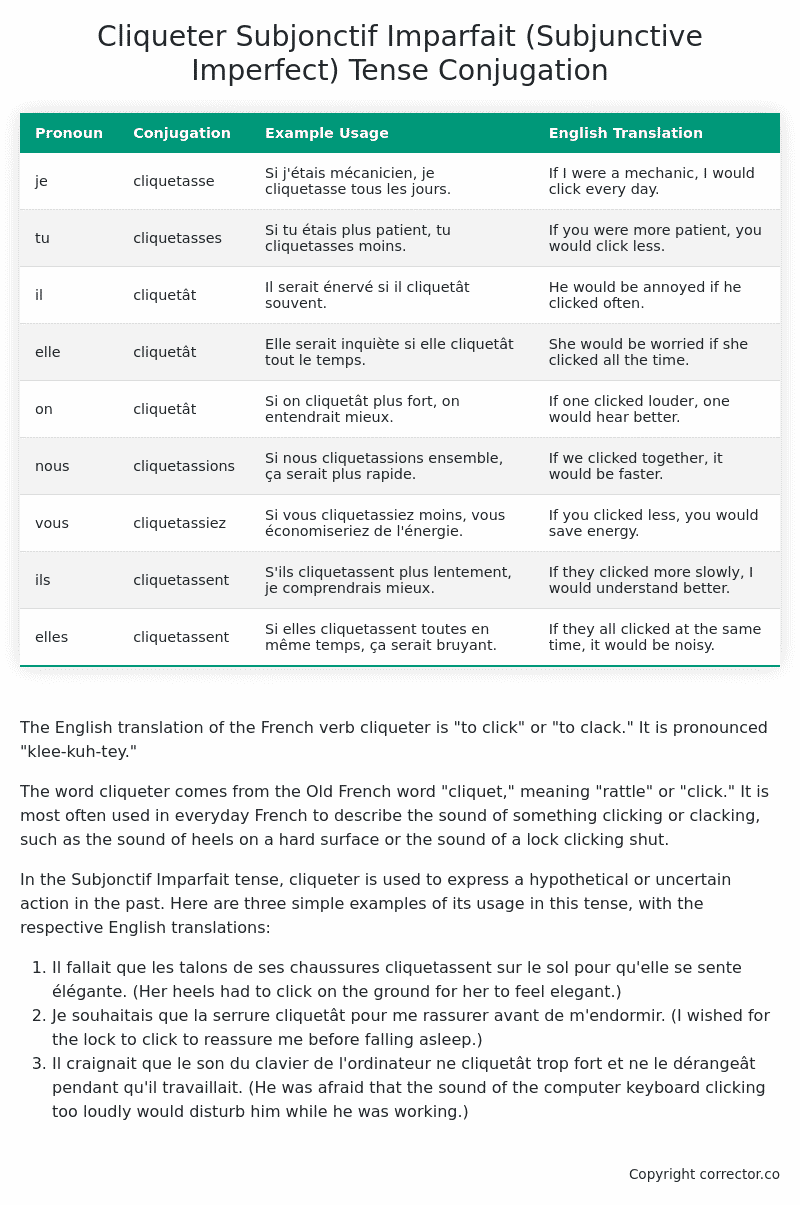Subjonctif Imparfait (Subjunctive Imperfect) Tense Conjugation of the French Verb cliqueter
Introduction to the verb cliqueter
The English translation of the French verb cliqueter is “to click” or “to clack.” It is pronounced “klee-kuh-tey.”
The word cliqueter comes from the Old French word “cliquet,” meaning “rattle” or “click.” It is most often used in everyday French to describe the sound of something clicking or clacking, such as the sound of heels on a hard surface or the sound of a lock clicking shut.
In the Subjonctif Imparfait tense, cliqueter is used to express a hypothetical or uncertain action in the past. Here are three simple examples of its usage in this tense, with the respective English translations:
- Il fallait que les talons de ses chaussures cliquetassent sur le sol pour qu’elle se sente élégante. (Her heels had to click on the ground for her to feel elegant.)
- Je souhaitais que la serrure cliquetât pour me rassurer avant de m’endormir. (I wished for the lock to click to reassure me before falling asleep.)
- Il craignait que le son du clavier de l’ordinateur ne cliquetât trop fort et ne le dérangeât pendant qu’il travaillait. (He was afraid that the sound of the computer keyboard clicking too loudly would disturb him while he was working.)
Table of the Subjonctif Imparfait (Subjunctive Imperfect) Tense Conjugation of cliqueter
| Pronoun | Conjugation | Example Usage | English Translation |
|---|---|---|---|
| je | cliquetasse | Si j’étais mécanicien, je cliquetasse tous les jours. | If I were a mechanic, I would click every day. |
| tu | cliquetasses | Si tu étais plus patient, tu cliquetasses moins. | If you were more patient, you would click less. |
| il | cliquetât | Il serait énervé si il cliquetât souvent. | He would be annoyed if he clicked often. |
| elle | cliquetât | Elle serait inquiète si elle cliquetât tout le temps. | She would be worried if she clicked all the time. |
| on | cliquetât | Si on cliquetât plus fort, on entendrait mieux. | If one clicked louder, one would hear better. |
| nous | cliquetassions | Si nous cliquetassions ensemble, ça serait plus rapide. | If we clicked together, it would be faster. |
| vous | cliquetassiez | Si vous cliquetassiez moins, vous économiseriez de l’énergie. | If you clicked less, you would save energy. |
| ils | cliquetassent | S’ils cliquetassent plus lentement, je comprendrais mieux. | If they clicked more slowly, I would understand better. |
| elles | cliquetassent | Si elles cliquetassent toutes en même temps, ça serait bruyant. | If they all clicked at the same time, it would be noisy. |
Other Conjugations for Cliqueter.
Le Present (Present Tense) Conjugation of the French Verb cliqueter
Imparfait (Imperfect) Tense Conjugation of the French Verb cliqueter
Passé Simple (Simple Past) Tense Conjugation of the French Verb cliqueter
Passé Composé (Present Perfect) Tense Conjugation of the French Verb cliqueter
Futur Simple (Simple Future) Tense Conjugation of the French Verb cliqueter
Futur Proche (Near Future) Tense Conjugation of the French Verb cliqueter
Plus-que-parfait (Pluperfect) Tense Conjugation of the French Verb cliqueter
Passé Antérieur (Past Anterior) Tense Conjugation of the French Verb cliqueter
Futur Antérieur (Future Anterior) Tense Conjugation of the French Verb cliqueter
Subjonctif Présent (Subjunctive Present) Tense Conjugation of the French Verb cliqueter
Subjonctif Passé (Subjunctive Past) Tense Conjugation of the French Verb cliqueter
Subjonctif Imparfait (Subjunctive Imperfect) Tense Conjugation of the French Verb cliqueter (this article)
Subjonctif Plus-que-parfait (Subjunctive Pluperfect) Tense Conjugation of the French Verb cliqueter
Conditionnel Présent (Conditional Present) Tense Conjugation of the French Verb cliqueter
Conditionnel Passé (Conditional Past) Tense Conjugation of the French Verb cliqueter
L’impératif Présent (Imperative Present) Tense Conjugation of the French Verb cliqueter
L’infinitif Présent (Infinitive Present) Tense Conjugation of the French Verb cliqueter
Struggling with French verbs or the language in general? Why not use our free French Grammar Checker – no registration required!
Get a FREE Download Study Sheet of this Conjugation 🔥
Simply right click the image below, click “save image” and get your free reference for the cliqueter Subjonctif Imparfait tense conjugation!

Cliqueter – About the French Subjonctif Imparfait (Subjunctive Imperfect) Tense
Formation
Common Everyday Usage Patterns
Interactions with Other Tenses
Subjonctif Présent
Indicatif Passé Composé
Conditional
Conditional Perfect
Summary
I hope you enjoyed this article on the verb cliqueter. Still in a learning mood? Check out another TOTALLY random French verb conjugation!


